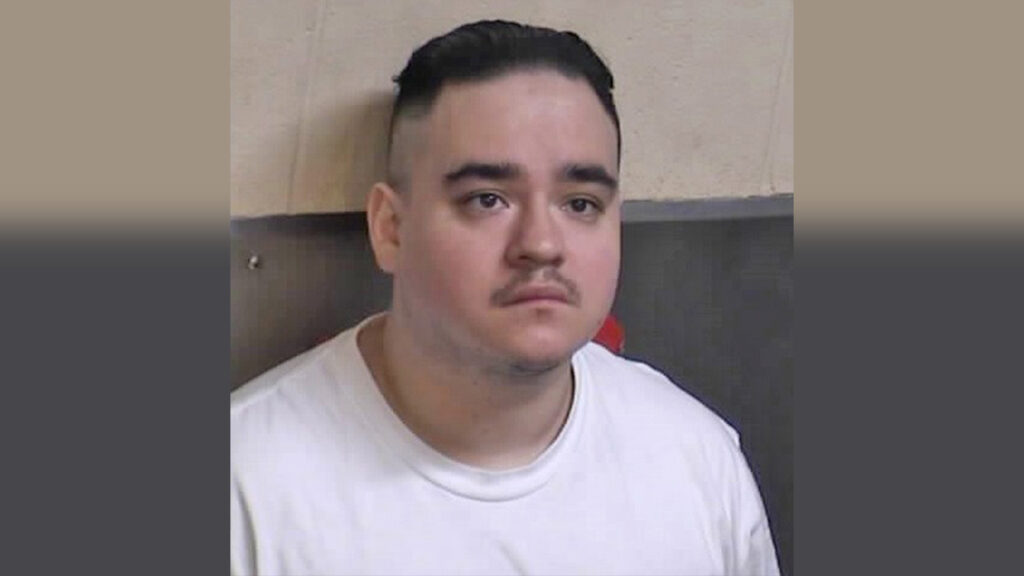Cargo theft losses total between $15 billion and $30 billion annually, according to the National Insurance Crime Bureau, and thieves are becoming increasingly sophisticated. (GV Wire Composite/Paul Marshall)

- From November 2022 to March 2023, cargo theft incidents increased by 600% according to an industry report.
- Cargo theft has become increasingly sophisticated with criminals creating fraudulent paperwork and trucks to seem like legitimate businesses.
- A bill from Central Valley congressman David Valadao (R-Hanford) creates a task force to specifically investigate cargo theft.
Share
Central Valley ag products have long been targets of criminals. But in the last year, theft of all kinds of cargo has reached levels never before seen. And, as thieves’ operations become increasingly sophisticated, one Valley congressman wants to stop them.
From November 2022 to March 2023, cargo theft incidents increased by 600%, according to the Transportation Intermediaries Association’s August 2024 report.
Fraud or theft of truck and rail cargo cost businesses an average $402,000 yearly, losing $40,760 per load. The National Insurance Crime Bureau estimates $15 billion to $30 billion in cargo theft losses each year.
Related Story: Tulare County Sheriff Investigates Grand Theft of Trailers, Grape Picking ...
And California, with its mega-ports in Long Beach and Oakland, suffers far and away more than any other state. In the first three months of 2024, the value of stolen shipments in California increased by 72% compared to the previous year.
Cargo theft has become so rampant that U.S. representatives David Valadao (R-Hanford) and Brad Schneider (D-Illinois) coauthored legislation to create a multi-agency task force dedicated to investigating these crimes.
“This rise in fraud is not just a financial burden,” the TIA report read. “It also increases the cost of goods, affecting the entire supply chain and ultimately impacting consumers.”

Cargo Theft Getting Increasingly Sophisticated
The representatives began working on the plan to create the cargo theft task force a year-and-a-half ago when general supply chain issues were still causing availability problems, according to congressional sources.
Railroad companies at that time reached out to Valadao about the criminal aspect.
In southern California, trains were being stopped with no explanation. Entire rail cars were being emptied. But when discussions with railroad companies began, it soon became clear the problem went beyond trains.
Trucking associations, retailers, and major carriers such as UPS all reached out to talk about the increasingly bigger problem of cargo theft.
“This is happening across the supply chain in all sorts of cargo shipments,” a congressional source told GV Wire.
A major delivery company told staffers how through cyberattacks, criminals can identify a specific item in a box in a shipment and steal it. Thieves target electronics most, considering how easily they can be resold.
Criminals can call in a fake order to a business and pick it up, only to disappear. Criminals can also find out about real shipments and create fake paperwork to get goods released to them.
Even after a shipment is stolen, it may not stop there. In a statement to TIA, CEO Rob Hoffman of Dedicated Carriers said after criminals stole $50,000 of yogurt, they threatened to steal more unless he paid a $40,000 ransom.
“Fraud has become an increasingly sophisticated and pervasive issue within the logistics industry,” the TIA report read. “As criminal methods evolve, so too must the strategies employed by companies.”
Many Cargo Thefts Inside Jobs
Rocky Pipkin, owner of the Pipkin Detective Agency, often investigates commercial theft. The Central Valley’s ag industry has long been a target for thieves, Pipken said.
Oftentimes, it’s people on the inside who help coordinate thefts.
“With a lot of the gangs, what they do is they will usually get somebody on the inside that is either planted there to work for them, to obtain intelligence as to how the inner workings of say an almond processing facility is,” Pipkin said.
Insiders share who is in shipping and receiving as well as processing procedures. Thieves are becoming more sophisticated for ag theft, as well.

Pipkin investigated the theft of $750,000 worth of processed almond a few years ago. Thieves knew what rules they had to follow, such as having a certificate of insurance for the haul. With only a smart phone, they found a legitimate insurer and mimicked the certificate, changing one digit of a phone number.
That phone number routed back to an accomplice in a hotel room where they would ask all the right questions and have all the necessary documentation. The driver came in with a stolen truck, and while the driver and processor enjoyed a cup of coffee, workers from the plant unwittingly gave their product to thieves, Pipkin’s investigation found.
“Just about the time that I think I’ve seen it all, somebody ups their game and has built a better mousetrap and gets away with it,” Pipkin said.
Bill Brings Together Existing Resources to Combat Theft
Valadao and Schneider have a two-pronged approach to creating the cargo theft task force. The first allocates $2 million in the House Appropriations bill to pool resources from existing agencies to create the task force.
The U.S. Department of Transportation has the scope but lacks enforcement capabilities, said a congressional source. The Department of Justice has tools, but not enough money. The Department of Homeland Security has the money, but not the tools.
In just a few pages, the appropriations bill language lays out what agency has what responsibilities. It also creates a crime coordination center.
The standalone Safeguarding our Supply Chains Act secures $100 million to fund the task force. The task force would mainly be under Homeland Security Investigations and the Department of Justice.
The congressional source said the bill has been growing in support, garnering a dozen or more representatives signing on to the bill.
“(The American Trucking Association) commends Congressman Valadao for introducing legislation to address this alarming trend and safeguard our supply chain,” said American Trucking Associations Senior Vice President Henry Hanscom. “The Supply Chain Fraud and Theft Task Force created by this bill would strengthen the partnership between motor carriers, law enforcement, the government, and other supply chain partners to strike an effective blow against organized crime.”
RELATED TOPICS:
Categories

Mac the Cat Is Guaranteed to Spice Up Your Life

Detectives Nab Suspected Fresno Online Predator


















